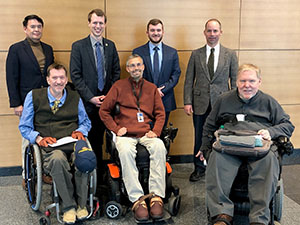
Minnesotans with disabilities who use the Personal Care Assistance (PCA) program are not able to use their caregivers to drive them around their community. In recognition of the importance of transportation for independent living, the Minnesota Council on Disability, in partnership with a broader disability community coalition, worked with Senator Mathews to introduce Senate File 2715. This bill would permit people with disabilities to have their PCA’s drive them under the Instrumental Activities of Daily Living.
Instrumental activities of daily living are the skills and abilities needed to perform certain day-to-day tasks associated with an independent lifestyle. These activities are not considered to be essential for basic functioning but are regarded as important for assessing day-to-day quality of life and relative independence. An evaluation of a person’s ability to manage instrumental activities of daily living is often used as one of several factors to assess whether an individual can safely continue to reside in their own home without outside assistance.
Assistance with transportation is considered one of the instrumental activities of daily living.
This small change in policy would permit Minnesotans with disabilities to live, work and enjoy life in the community of their choosing.
MCD Council Member and independent living advocate Ted Stamp testified at a recent Senate hearing on this bill. He shared the impact that this bill would have on his life.
[begin testimony]
Good afternoon, my name is Ted Stamp, and I’m just one of the many faces across the state affected by this issue. I live in Marshall, where for the last 14 years I have worked as an Independent Living Advocate for the Southwestern Center for Independent Living.
I’ve had to depend on others for my transportation since June, 29, 1993, when as an 18-year-old my life was instantly transformed by a spinal cord injury. Ever since, I’ve been fortunate to have my own vehicle to get where I’ve needed to go, whether to the store or medical appointments or social events. In all that time I never wondered whether or not having my caregivers drive me was allowed by state statute, nor did other people with disabilities I met. And we didn’t ask. It was just common sense. We couldn’t drive ourselves. We had our own vehicles and someone willing to drive them (mostly the PCAs who work for us). So they drove us where we need to go—in town or out of town; morning, afternoon or night. For the better part of 24 years I took this arrangement for granted.
Then one day someone said, the State statute doesn’t allow it. So what do you do? Despite how unreasonable it seems, you have no choice but to become dependent on local public transit buses, which are busy all day, every day, especially in a rural location like Marshall. This often means being unable to get to and from where you need to go when you want to, if at all. It means waiting for rides, and just as often extended ride times—even in Marshall it’s not uncommon to ride half an hour one-way. It means limited options for scheduling rides in the evenings and on weekends. All of which affects whether or not, or to what degree, a person is employed or in good health or engaged in the life of the community. It means having to send your PCAs to the store with a list instead of going with them, which often results in winding up with products you didn’t want because you weren’t there to specify. It means going to the store by yourself and only being able to buy as much as you can fit on your lap and get into your refrigerator by yourself when you get home. And this is for those of us privileged enough to have decent public transit options, which much of Greater Minnesota does not.
Moreover, when people in this situation have to use medi-van services for out-of-town medical appointments, does it make sense that the state should pay the drivers of these vehicles at a higher rate than a PCA could be paid for doing the same job? Especially since the PCA is often riding along, which means the state is paying for two people when only one is needed, who could be the PCA and the driver. Does it make sense that PCAs should be prevented from driving their clients to the hospital/clinic when necessary, when not doing so would force them to rely on either the busy/limited public transit system just mentioned, if available, or on an ambulance, which again comes at a much greater financial burden to the state? And to the argument that because the PCA is driving they cannot also serve their client’s needs, first, they are serving their client’s need by driving, and second, they are not prevented from helping their clients in other ways, since they can do so by simply pulling the vehicle over. Lastly, under the present restrictions, how are such individuals supposed to visit out-of-town family and friends—especially if they have no nearby friends or family to drive them?
Thank you so much for taking the time to understand the important impacts of this issue, and for the honor and privilege of testifying today.
[end testimony]